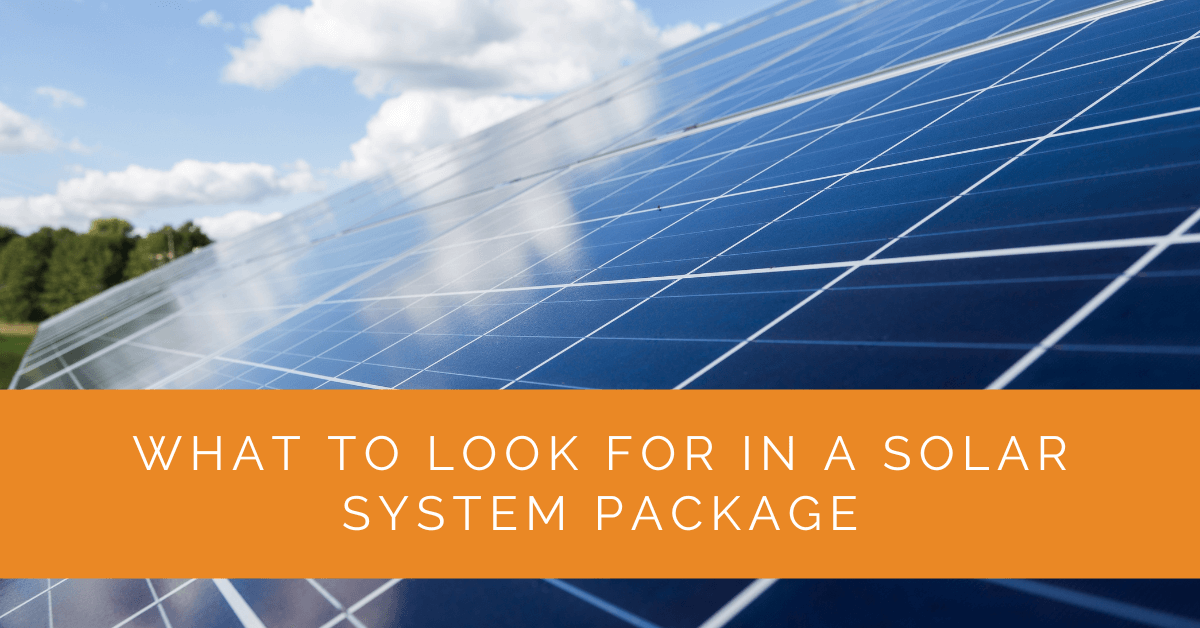Solar power has emerged as a viable and sustainable energy solution in recent years. As more homeowners embrace the benefits of solar energy, it’s essential to understand what to look for in a solar system package. From solar panels and inverters to installation options and financial considerations, this guide will provide the necessary insights to make an informed decision and embark on a successful solar journey.
Contents
- 1 Key Takeaways
- 2 Types of Solar Panels
- 3 Choosing a Solar Inverter
- 4 Solar System Kits: Ready-to-Install Solutions
- 5 Factors to Consider When Buying Solar Panels
- 6 Solar Panel Installation: Professional vs. DIY
- 7 Case Study: Choosing the Right Solar System Package for Optimal Performance
- 8 Expert Insights From Our Solar Panel Installers About What to Look for in a Solar System Package
- 9 Experience Solar Excellence with Us!
- 10 Conclusion
Key Takeaways
- When choosing a solar system package, consider the type of solar panels, such as monocrystalline, polycrystalline, and thin-film, based on factors like efficiency, space availability, and budget.
- Selecting the right solar inverter is crucial for optimal energy conversion, and options include string inverters, microinverters, and hybrid inverters.
- Solar system kits offer convenient, ready-to-install solutions, but evaluating panel capacity, inverter type, and mounting options is important to ensure they meet your energy needs and budget. Factors like solar panel efficiency, warranties, installation considerations, and the decision between professional and DIY installation should be carefully considered.
Types of Solar Panels
Choosing the right type of solar panel is crucial for the performance and efficiency of your solar system. There are three main types: monocrystalline, polycrystalline, and thin film.
Monocrystalline Solar Panels
Monocrystalline panels are made from a single crystal structure, typically silicon, resulting in their uniform appearance. Their high efficiency and sleek aesthetics make them a popular choice among homeowners. Monocrystalline panels perform well in limited space and are known for their durability and longevity. Due to their higher efficiency, they generate more power per square foot, making them an ideal choice for maximizing power output in situations with limited roof space. However, monocrystalline panels are generally more expensive compared to other types.
Polycrystalline Solar Panels
Polycrystalline panels are made from multiple crystal structures, giving them a characteristic speckled appearance. They are cost-effective and perform well in various conditions, making them popular for residential installations. Polycrystalline panels have slightly lower efficiency than monocrystalline panels but provide a solid balance between cost and performance. They are suitable for homeowners looking for a cost-effective solution without compromising overall performance.
Thin-Film Solar Panels
Thin-film panels utilize a different technology involving depositing thin layers of photovoltaic material onto a substrate, such as glass or flexible materials. Thin-film panels offer flexibility, lightweight design, and versatility in installation options. They are less efficient than crystalline silicon panels but perform better in low-light conditions and high temperatures, making them suitable for specific residential or commercial applications. Thin-film panels are often used in large-scale installations due to their scalability and compatibility with unique project requirements.
When selecting a solar panel type, it’s important to consider factors such as space availability, budget, efficiency requirements, and aesthetic preferences. Consulting with a reputable solar installer can provide valuable insights and help determine the most suitable option for your needs.
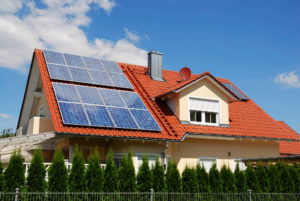
Choosing a Solar Inverter
The solar inverter is a critical component of your solar system, responsible for converting the direct current (DC) produced by the solar panels into usable alternating current (AC) electricity. Choosing the right inverter ensures optimal energy conversion and system performance.
String Inverters
String inverters are the most common and cost-effective option for residential solar installations. They are connected to multiple solar panels in a series called a string. String inverters perform the DC to AC conversion for the entire string of panels. They are reliable and efficient, with a proven track record in the industry. However, it’s important to note that the performance of the entire string can be affected if one panel in the string is shaded or underperforming. In such cases, the overall system efficiency may decrease.
Microinverters
Microinverters are an alternative to string inverters, providing panel-level optimization and greater system flexibility. Unlike string inverters, microinverters are installed on each solar panel. This allows independent DC to AC conversion at the panel level, maximizing energy harvest and overcoming shading or underperformance issues. Microinverters enable greater system performance and can be particularly beneficial when partial shading or complex roof configurations are present. Each panel operates independently, ensuring that the overall system efficiency is not affected by the performance of a single panel. This flexibility in energy production can result in higher overall energy yields compared to string inverters.
Microinverters also offer advanced monitoring capabilities, allowing homeowners to track the performance of each panel in real time. This level of monitoring provides valuable insights into the system’s health, identifies any underperforming panels, and facilitates timely maintenance or troubleshooting.
However, it’s important to note that microinverters can be relatively more expensive compared to string inverters due to the need for individual inverters for each panel. Additionally, the complexity of the installation and potential maintenance requirements should be considered when choosing microinverters.
Hybrid Inverters
Hybrid inverters combine the functions of a solar inverter and a battery inverter. They are suitable for homeowners interested in adding battery storage to their solar system in the future or those seeking greater energy independence.
Hybrid inverters enable the integration of solar panels with battery storage systems, allowing excess solar energy to be stored and used during low sunlight or power outages. These inverters manage the flow of electricity between the solar panels, the battery, and the grid. When solar production exceeds consumption, the excess energy charges the battery for later use. When solar production is insufficient, the stored energy in the battery is utilized to power the home.
By investing in a hybrid inverter, homeowners can maximize their solar energy usage and reduce dependence on the grid. This setup offers the advantage of backup power during power outages and optimizing energy consumption according to time-of-use rates or grid fluctuations.
When choosing a solar inverter, consider factors such as system design, shading issues, future expandability (particularly if battery storage is a consideration), monitoring capabilities, and budget. Consulting with a reputable solar installer will provide valuable insights into the most suitable inverter type for your specific requirements.
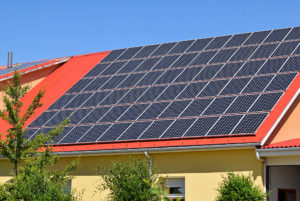
Solar System Kits: Ready-to-Install Solutions
Solar system kits offer a convenient and comprehensive package that includes everything you need to start generating solar power. These kits provide an all-in-one solution for residential and small-scale applications, making the transition to solar energy more accessible and straightforward.
Solar system kits typically include solar panels, inverters, mounting hardware, wiring, and other necessary components. They are designed to be user-friendly, allowing homeowners to install the system themselves or with minimal professional assistance.
Panel Capacity
One of the key considerations when selecting a solar system kit is the panel capacity. Panel capacity refers to the wattage rating of the included solar panels and determines the system’s power-generating potential. Assessing your energy needs and consumption patterns is crucial in determining the appropriate panel capacity for your home. It’s important to balance power capacity and upfront cost to ensure the kit meets your requirements while remaining within your budget.
Inverter Type
Solar system kits come with pre-selected inverters compatible with the included solar panels. The inverter is responsible for converting the DC power generated by the panels into usable AC power. The type of inverter included in the kit will depend on the manufacturer’s specifications and the system’s specific requirements. Ensure that the inverter can efficiently convert the DC power into AC power and is suitable for your energy consumption needs.
Mounting Options
Consider the mounting options provided with the solar kit. Mounting options can include roof or ground mounts, depending on your property’s configuration and preferences. Evaluate the compatibility of the mounting system with your roof type, available space, and any specific requirements or constraints. Additionally, consider the ease of installation and any additional costs associated with mounting hardware.
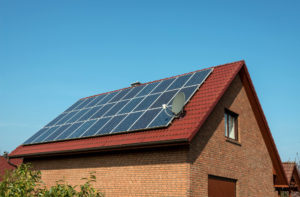
Considerations for Choosing a Solar System Kit
Solar system kits provide a convenient and cost-effective solution for homeowners looking to go solar without the complexities of individual component selection. However, it’s important to carefully review the specifications and features of each kit to ensure it meets your unique requirements.
Another advantage of solar system kits is that they often include detailed installation instructions and support, making the installation process more manageable for homeowners. However, assessing your skill level and comfort with DIY projects is essential before deciding to install the system yourself. If you’re not confident in your abilities or your installation requires complex electrical work, hiring a professional installer is advisable to ensure the system is installed safely and effectively.
When considering a solar system kit, it’s crucial to evaluate the quality and reputation of the manufacturer. Look for kits from reputable companies with a proven track record of delivering reliable, high-performance products. Reading customer reviews and seeking recommendations from trusted sources can provide valuable insights into the quality and performance of different solar system kits.
Additionally, consider the warranty provided with the kit. A comprehensive warranty that covers both the solar panels and the inverter is important to protect your investment and ensure long-term performance. Pay attention to the duration and coverage of the warranty and the manufacturer’s reputation for honoring warranty claims.
Finally, factor in any financial incentives and potential cost savings associated with the solar system kit. Research the availability of government rebates, tax credits, or other incentives in your area. Consider the long-term return on investment and how the solar system will help you save on your electricity bills over time.
Solar system kits offer a simplified and comprehensive approach to solar installation, making it easier for homeowners to embrace solar power. However, it’s important to carefully consider your specific energy needs, budget, and installation capabilities before choosing a kit. Consulting with a reputable solar installer can provide valuable guidance and ensure you select a solar system kit that meets your unique requirements.
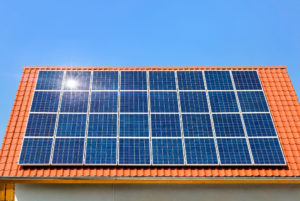
Factors to Consider When Buying Solar Panels
Solar panels are a fundamental solar system component responsible for converting sunlight into usable electricity. When buying solar panels, there are several important factors to consider:
Solar Panel Efficiency
Efficiency is a measure of how effectively solar panels convert sunlight into electricity. Higher-efficiency panels generate more power per square foot and can be advantageous if you have limited roof space. However, high-efficiency panels often come at a higher cost. Consider your space availability, budget, and desired energy output when evaluating the efficiency of solar panels.
Performance Warranty
A performance warranty guarantees that the solar panels will maintain a certain power output level over time. Assessing the duration and degradation rate specified in the warranty is crucial. A longer warranty period and lower degradation rate indicate that the panels will continue to perform effectively for an extended period.
Certifications and Standards
Look for solar panels certified by reputable organizations such as the International Electrotechnical Commission (IEC) and Underwriters Laboratories (UL). These certifications ensure that the panels meet international quality and safety standards. Additionally, check for other relevant certifications, such as the TÜV Rheinland certification for performance and durability.
Solar Panels Cost and Financial Incentives
Evaluate the upfront cost of the solar panels and compare prices from different suppliers. Consider the long-term savings on your electricity bill when evaluating the overall cost-effectiveness of the panels. Additionally, research the availability of government rebates, tax credits, or other financial incentives in your area. These incentives can significantly offset the initial cost of the panels and provide a quicker return on your investment.
Solar Panel Installation Considerations
Take into account any specific installation considerations when purchasing solar panels. Factors such as the weight and dimensions of the panels, as well as compatibility with your roof type, should be evaluated. If you have limited roof space, consider high-efficiency panels or explore other mounting options, such as ground-mounted systems.
Consulting with a reputable solar installer is highly recommended when buying solar panels. They can provide valuable guidance on selecting the right panels based on your specific needs and can ensure that the installation is carried out safely and efficiently.
Furthermore, conducting thorough research and reading customer reviews on different panel manufacturers can provide insights into their products’ performance, reliability, and customer satisfaction. Look for reputable brands with a proven track record in the industry and positive reviews from homeowners who have installed their panels.
It’s also essential to consider the warranty offered by the panel manufacturer. A comprehensive warranty covering the product and its performance is crucial to protect your investment. Pay attention to the duration of the warranty and any limitations or exclusions that may apply.
Additionally, take into account the expected lifespan of the solar panels. High-quality panels can last 25 years or more, so choosing panels that will provide reliable performance over the long term is important.
Finally, consider the aesthetics of the solar panels, especially if visual appeal is a significant factor for you. Some homeowners prefer panels with a sleek and uniform appearance, while others may be more interested in panels that blend in with the roof or have a specific color or design. Discuss your preferences with the solar installer to find panels that meet your performance and aesthetic requirements.
By carefully considering factors such as efficiency, warranty, certifications, cost, installation considerations, and customer reviews, you can make an informed decision when purchasing solar panels. Remember that the panels are a long-term investment, and choosing high-quality and reliable products will ensure that your solar system performs optimally and provides clean and renewable energy for years to come.
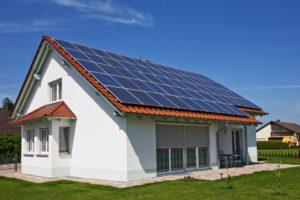
Solar Panel Installation: Professional vs. DIY
When it comes to solar panel installation, you can hire a professional installer or take the do-it-yourself (DIY) approach. Each option has its advantages and considerations that should be carefully evaluated.
Professional Solar Panel Installation
Hiring a professional installer offers several benefits, particularly if you’re new to solar energy or prefer to have experts handle the installation process. Some key advantages of professional installation include the following:
- Expertise and Experience: Professional installers have in-depth knowledge and experience designing and installing solar systems. They are familiar with local regulations and best practices, ensuring the installation complies with safety standards and building codes.
- Site Assessment and Design: Professionals can conduct a thorough site assessment to determine the best placement and positioning of the solar panels for optimal performance. They can evaluate shading, roof orientation, and structural integrity to design a system that maximizes energy production.
- Permitting and Paperwork: Solar installations often require permits and paperwork. Professional installers are well-versed in the necessary documentation and can handle the process efficiently, saving you time and effort.
- Warranties and Guarantees: Reputable installers typically offer warranties and guarantees on the installation workmanship and the solar system’s performance. This ensures that any issues or concerns that arise after installation will be addressed promptly and effectively.
- Time and Convenience: Hiring professionals allows you to sit back and relax while they take care of the entire installation process, from start to finish. This saves you valuable time and eliminates needing specialized tools or equipment.
DIY Solar Panel Installation
Opting for a DIY installation can be appealing if you have prior experience or enjoy hands-on projects. However, it’s crucial to consider the following factors before embarking on a DIY solar installation:
- Skill and Experience: Solar panel installation requires a certain level of technical skill and knowledge of electrical systems. DIY may not be the best option if you don’t have previous experience in electrical work or solar installations.
- Safety Considerations: Working with electricity can be dangerous, and improper installation can lead to electrical hazards or system malfunctions. It’s essential to prioritize safety and ensure that you have a good understanding of the necessary safety precautions and protocols.
- Complex Electrical Work: Solar panel installation involves electrical wiring and connections. If you’re unfamiliar with electrical systems, hiring a professional to ensure the proper installation and connection of the panels to the electrical grid is recommended.
- Permitting and Regulations: DIY installations often require homeowners to navigate the permitting process, which can be time-consuming and challenging. Researching and complying with local regulations, building codes, and utility requirements is crucial to avoid any legal or safety issues.
- Tools and Equipment: DIY installations require specialized equipment for proper panel mounting, wiring, and connection. Acquiring these tools can add to the upfront costs of the installation, especially if you don’t already have them.
- Warranty and Support: DIY installations may not have the same level of warranty or support as professional installations. If you encounter any issues or system failures, troubleshooting and finding solutions may be more challenging without professional assistance.
Despite the considerations and challenges, DIY solar panel installations can be a rewarding experience for homeowners with the necessary skills and experience. It offers the opportunity to learn about solar energy systems, gain hands-on knowledge, and potentially save on installation costs.
Ultimately, the decision between professional installation and DIY depends on your comfort level, expertise, and the complexity of the installation. If you have any doubts or concerns about your ability to safely and effectively install the system, hiring a professional installer is recommended. They will ensure your solar panels are correctly installed, properly connected, and comply with all safety regulations.
Case Study: Choosing the Right Solar System Package for Optimal Performance
Background
At Solar Panels Network USA, we strive to guide our clients in selecting the most suitable solar system packages to meet their energy needs and sustainability goals. This case study highlights our approach to helping a homeowner choose and install the ideal solar system package.
Project Overview
Our client, a homeowner with moderate energy needs, sought to reduce their electricity bills and embrace renewable energy. They required a solar system package that was efficient, reliable, and fit within their budget.
Implementation
Understanding Solar Panel Types
We began by educating the client on the different types of solar panels: monocrystalline, polycrystalline, and thin-film. Given their limited roof space and desire for high efficiency, we recommended monocrystalline panels. These panels are known for their high efficiency and long lifespan, making them a perfect fit for maximizing power output from a small area.
Selecting the Right Inverter
The next step was to choose an appropriate inverter. Given the potential for shading from nearby trees, we opted for microinverters. These inverters offer panel-level optimization, ensuring that shading on one panel does not impact the performance of the entire system. This choice maximized energy harvest and provided flexibility in system design.
Choosing a Solar System Kit
We recommended a comprehensive solar system kit that included high-efficiency monocrystalline panels, microinverters, mounting hardware, and wiring. This all-in-one solution simplified the installation process and ensured compatibility among components. The kit was from a reputable manufacturer known for their high-quality products and excellent customer service.
Installation Considerations
While the client initially considered a DIY installation, we discussed the complexities and potential safety concerns. Given the need for electrical work and the importance of proper system setup, the client opted for professional installation. This ensured compliance with local regulations and optimal system performance.
Financial Incentives and Cost Savings
We assisted the client in researching available financial incentives, including government rebates and tax credits. These incentives significantly offset the upfront cost of the solar system, enhancing the return on investment. Additionally, we projected long-term savings on their electricity bills, demonstrating the financial viability of the investment.
Results
The chosen solar system package met all of the client’s requirements:
- High Efficiency: The monocrystalline panels provided excellent power output, maximizing energy generation from the limited roof space.
- Optimal Performance: Microinverters ensured consistent performance despite shading issues, resulting in higher overall energy yields.
- Simplified Installation: The comprehensive solar system kit streamlined the installation process, reducing potential compatibility issues.
- Financial Benefits: The client benefited from financial incentives and long-term electricity savings, making the investment economically sound.
Summary
At Solar Panels Network USA, our goal is to provide tailored solar solutions that meet our clients’ unique needs. By guiding them through the selection of solar panel types, inverters, and system kits, we ensure they make informed decisions that maximize efficiency and cost savings. Our expertise and commitment to quality ensure that our clients enjoy reliable, sustainable energy solutions. Embrace the power of solar energy with our expert guidance and transform your home into a clean energy hub.
Expert Insights From Our Solar Panel Installers About What to Look for in a Solar System Package
Selecting the right type of solar panels is crucial. Monocrystalline panels, for instance, offer high efficiency and durability, making them ideal for homeowners with limited roof space but wanting to maximize power output.
Senior Solar Installation Engineer
Choosing the appropriate inverter is key to system performance. Microinverters, for example, provide panel-level optimization, which is beneficial in areas with shading issues or complex roof configurations.
Lead Solar Technician
Opting for a solar system kit can simplify the installation process. These kits typically include everything you need and are designed to be user-friendly, making solar power more accessible to homeowners.
Solar Energy Consultant
Experience Solar Excellence with Us!
Trust in Solar Panels Network USA, where our seasoned experts deliver top-quality solar solutions for homes and businesses nationwide. With a legacy of countless successful installations and a commitment to sustainable energy, we’re your reliable partner in the solar journey. Ready for a brighter, eco-friendly future? Call us now at (855) 427-0058 and harness the power of the sun!
Conclusion
When considering a solar system package, evaluating factors such as solar panel types, inverter options, system kits, panel efficiency, installation choices, and financial considerations is important. By understanding these key aspects, you can make an informed decision that aligns with your energy needs, budget, and sustainability goals. Whether you choose to go with a professional installation or take the DIY route, solar power has the potential to transform your home into a clean energy hub, reducing your reliance on the grid and providing long-term cost savings. Remember to consult with reputable solar installers, gather multiple quotes, and thoroughly research the components and warranties offered by different solar system packages.
About the Author
Solar Panels Network USA stands at the forefront of solar energy solutions, driven by a team of seasoned solar engineers and energy consultants. With over decades of experience in delivering high-quality solar installations and maintenance, we are committed to promoting sustainable energy through customer-centric, tailored solutions. Our articles reflect this commitment, crafted collaboratively by experts to provide accurate, up-to-date insights into solar technology, ensuring our readers are well-informed and empowered in their solar energy decisions.

